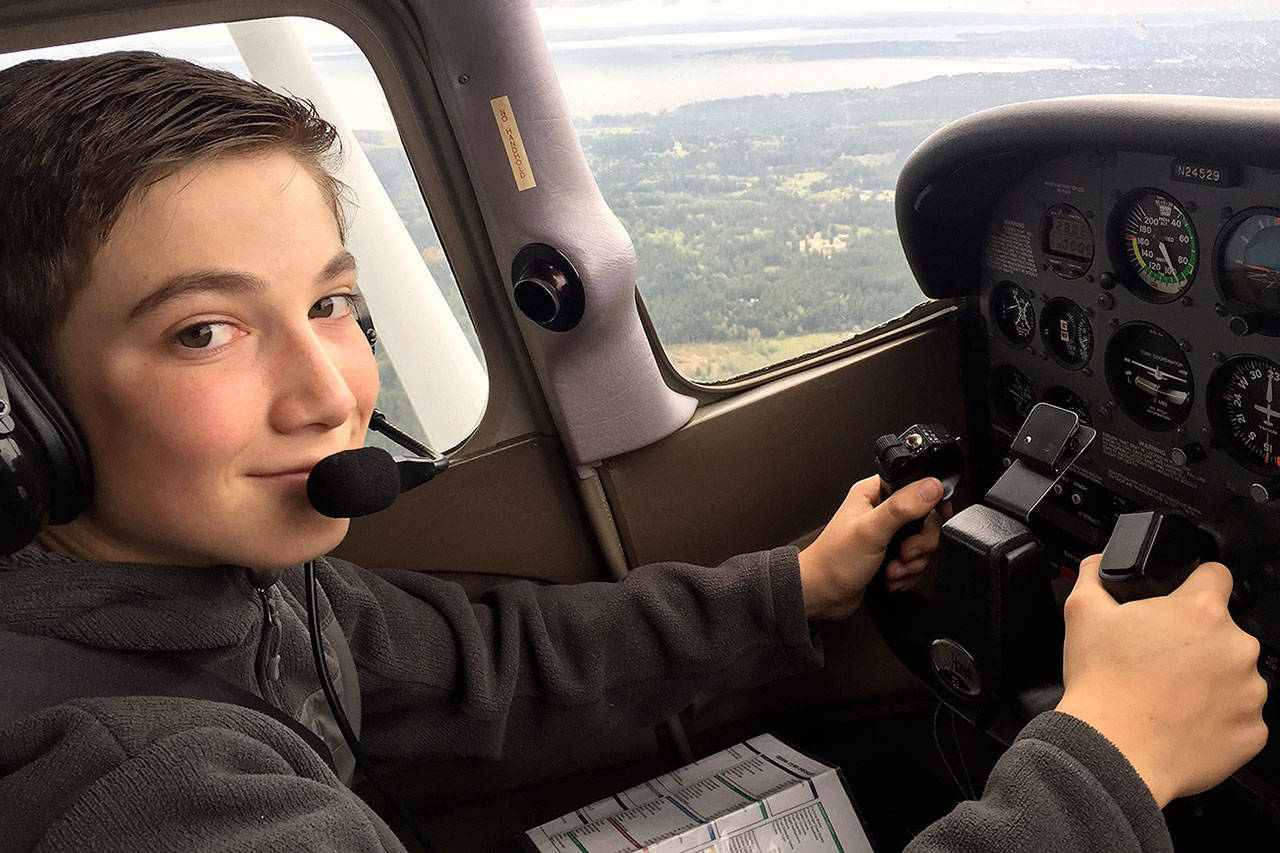Rowen Stephens has wanted to fly since the fifth grade. But only when the 14-year-old was tasked with working on his eighth grade final project did his dream take flight.
That’s because for his eighth grade project, Stephens could do whatever he wanted — as long as he sought mentorship from local leaders in his topic of choice. Naturally, he turned to two South Whidbey pilots.
“I remember basically looking forward to this project for 12 years,” Stephens said. “It’s gone so well that we’re continuing to meet without the project since we all liked it so much. It just gives us a reason to fly.”
Stephens was among seven other Whidbey Island Waldorf School eighth graders who have spent the past six months preparing for their eighth grade project presentations. The students were told to give an in-depth speech on any activity of their choosing, from welding sculptures and equine massage to flying planes. It was more of a hands-off assignment for eighth grade teacher Ashley Umlauf, who sat back and let her students seek a teacher of their own from the community.
“The project the students work on throughout the year is up to them; they need to figure out what to do in the first place and then reach out to someone in the community who could be a mentor,” Umlauf said. “Then they need to convince them to work with them. It’s a real investment for the community member they choose, and the process of locating a mentor develops social skills.”
The students connected to a number of prominent community members: local metal artist Scott Alexander, chef Patricia Aimsler and costume designer Jade Iverson to name a few. For about six months, they met with their mentors at least once a week for a few hours. By the time their presentations came around at the end of March, the students already had work to show for it, from a welded geometric sculpture to a hand-made cosplay outfit.
Stephens found mentorship in the form of Langley pilot and former Boeing employee Peter Morton and Langley pilot Aaron Simpson, who co-owns a Cessna 150 Aerobat that flies out of Whidbey Airpark. Each Tuesday evening, they met to glance over educational pilot information and interview industry professionals, most of which Stephens accessed through Morton’s Boeing connections. After passing the tests his mentors set for him, Stephens would then practice basic flying maneuvers on flight simulators: landings, take-offs and turns, for example.
Simpson says Stephens was lucky to have Morton as a mentor, who he describes as being “uniquely qualified.” Morton had access to flight simulators, including one for a 737, airline executives and a plane he shared through Boeing. Morton even organized for Stephens to fly down to the Horizon Airlines base in Portland to meet the company’s director of pilot development and recruiting, LaMar Haugaard.
Simpson gave Stephens the opportunity to fly more regularly out of Whidbey Airpark, as Morton’s plane was based out of Renton.
“These two guys, including a former higher-up in Boeing, were so ready and willing to take me flying,” Stephens said. “That enthusiasm really inspired me and made me feel like I have a lot of opportunities with flying.”
Another eighth grader, Killoran Jenkins, also found ways to try his hand at something new while making his work visible. He wanted to do something theatrical, and was drawn to the process of creating props for plays and musicals. He sought out the most qualified person to mentor a young person in the theater field: Whidbey Children’s Theater Artistic Director Kathryn Lynn Morgen.
Morgen set Jenkins up for his work to be seen by hundreds of theatergoers. She directed him to craft props for the children’s theater’s first three plays of the season, The Secret Garden, Hinterland and The Lion King. Although Jenkins said in his presentation he wasn’t dead-set on a career in theater, like Stephens is with aviation, it’s something he’s interested in possibly pursuing further. For him, it was a matter of trying something new.
“This was a way to broaden my horizons,” Jenkins said during his presentation.
For both the students and their mentors, the project illustrated how important it is for youth to pursue what they’re most interested in. Stephens said an open-ended project like this allows kids like him to start thinking about what they want to do from an early age. For him, experimenting and “taking yourself out of your comfort zone” is key to development.
“I think this project, with all the students, really showcased that if a person is interested in something, the first thing they should do is reach out to someone relevant to that interest and ask to go on a journey together,” Simpson said. “This is proof that you have access to depths of knowledge here and you’d be a fool to waste it. Rowen definitely didn’t.”



